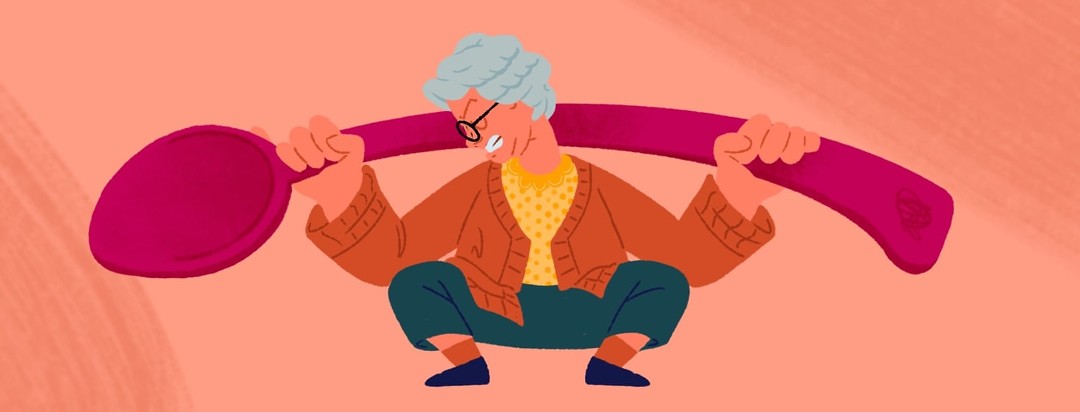Spoonie Strong
Whether you are new to your rheumatoid arthritis journey or a veteran you may have heard the term “spoonie” thrown around. Many people with chronic illnesses call themselves “spoonies”. If you don’t know what it means then you probably think we are all parading around like cutlery. As cool as that would be, we are not comparing ourselves to spoons or other shiny metal utensils.
What is the spoon theory?
The term “spoonie” comes from the original Spoon Theory, coined by Christine Miserandino, a Lupus warrior.1 It is how she explained, to her able-bodied friend, how she lived with an autoimmune condition. If you have not read about the Spoon theory I highly recommend you do. It is a perfect description of what we go through every day.
Briefly, the spoon theory uses spoons to objectively quantify energy. Unlike healthy people who have limitless amounts of energy (or, no spoons), we chronic illness warriors, only have a certain amount of it that doesn’t regenerate quickly.
Explaining life with an autoimmune condition
Christine and her friend were sitting in a diner and, as I am sure you have experienced, her concerned friend asked, “What is it like to have Lupus?” (Shameless plug: I’ve written an article on the subject, if you’re interested!) At that second, Christine was at a loss. How would she explain Lupus to a healthy, able-bodied person who has no physical limitations? It came to her: spoons!
She grabbed as many spoons as she could and handed the very strange bundle to her friends. Have you ever gifted a bouquet of spoons to someone? No? Well, their expression is priceless. I personally have not used spoons but writing implements to explain this theory. Sorry! I don’t always have an excess of utensils lying around!
Talking through a normal day
Christine asked her friend to talk through her normal day, which she did and without thinking, lumped some key things together (like showering and dressing).
To a healthy individual, those are whatever events. Sure, these tasks take time but it’s not really skin off their back whether they decide to wash their hair or wear pants with zippers and buttons.
Christine started to take away spoons and started giving different scenarios. What if your hands hurt? Can you even button up a shirt? What if you look as ill as you feel? You better save an extra spoon or keep aside energy to look more presentable.
Her friend was mortified: she had already gone through half her spoons before even going to work.
'What happens when I run out of spoons? Sorry, your day is done! Can I borrow from tomorrow? Sure, but imagine how hard tomorrow will be with fewer spoons.' (paraphrased)
A finite amount of energy with RA
They went through the entire day and Christine’s friend became very upset. She had used up her spoons and the day wasn’t over. Seeing those shiny utensils slip away from her hand, she realized that chronic illness warriors only have a finite amount of energy. She could see, with her own eyes, that Christine had to consider every task and every action over the course of a day, sometimes more.
Every able-bodied or healthy person has limitless spoons. They don’t even know that spoons exist which is obvious by the look of confusion when handed a definite number of objects.
They do not have to think about how much energy something takes, how deciding on what to eat for breakfast affects their evening. They just decide to do something because they want to do it. That is what we call able-bodied privilege.
Spoon theory helps explain daily challenges
Healthy people have the privilege of living life the way they want free of disability, pain, and accommodations. It’s not an embarrassing thing; it’s just life. They are lucky they live a carefree one (when it comes to physical ability).
Christine came up with a wonderful way to express the finite energy all autoimmune warriors manage on a daily basis. We are not free of disability or accommodations. Those things cloud every decision we make.
Being a spoonie & RA
As with most social media trends, the term “spoonie” sprung up to describe people like her and it stuck. We are Spoonies and we are Spoonie strong. Yes, we have spoons but we have gotten very good at spreading them out, using them sparingly, and clinging on to them for dear life. Because let’s face it - spoons are our rarest commodity.
I just wish we could actually give and take them as easily as it was for her friend, but unfortunately, we have not discovered that type of technology yet.
Next time someone asks you what it’s like to live with rheumatoid arthritis and you have a bit of time, shove a bunch of spoons, or forks, or even knives in their hands. Speaking from experience, it’s a pretty good way to show what we go through on the daily!

Join the conversation